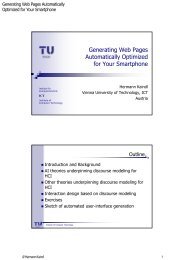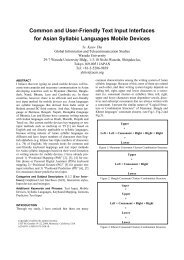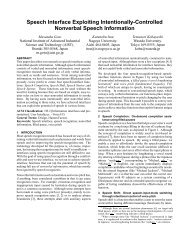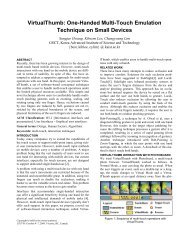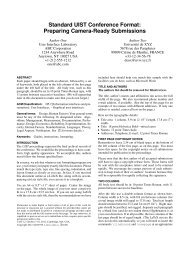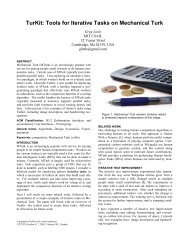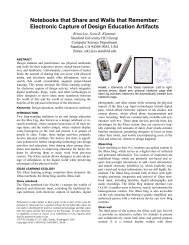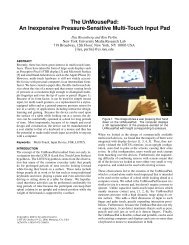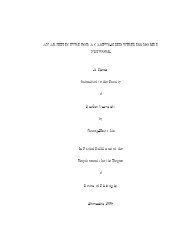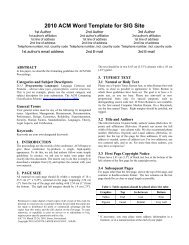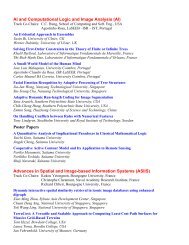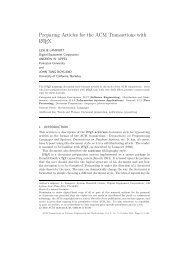API Design Matters Stonebraker and Seltzer - RabbitMQ
API Design Matters Stonebraker and Seltzer - RabbitMQ
API Design Matters Stonebraker and Seltzer - RabbitMQ
Create successful ePaper yourself
Turn your PDF publications into a flip-book with our unique Google optimized e-Paper software.
your desk, but that beats a cot in your office so that you<br />
can work around the clock for a week recovering from a<br />
compromise. Sadly, I know of one company where they<br />
did bring in those cots for a number of engineers during<br />
a weeks-long recovery project following a breach. Worse,<br />
they procrastinated on deciding to build a firewall until<br />
after this event. Q<br />
ACKNOWLEDGMENTS<br />
This article is based on RealWorld Linux Security: Intrusion,<br />
Detection, Prevention, <strong>and</strong> Recovery, second edition, by Bob<br />
Toxen (Prentice Hall PTR, 2003, ISBN 0130464562); chap-<br />
ter 2, section 2, “The Seven Most Deadly Sins.”<br />
Thanks to Prentice Hall PTR for granting permission to<br />
use material from the book in this article. Thanks to Larry<br />
Gee, a very talented programmer, for co-authoring this<br />
section of the book.<br />
REfERENCES<br />
1. NFS consists of these daemons <strong>and</strong> a few more, includ-<br />
ing: rpc.nfsd, rpc.mountd, portmap, rpc.lockd, rpc.<br />
statd, rpc.rquotad, <strong>and</strong> automounter, scattered among<br />
a number of startup scripts. A cracker process can lie<br />
to portmap <strong>and</strong> masquerade as a legitimate server.<br />
NFS has had plenty of security bugs in the past, <strong>and</strong><br />
The Linux 2.6 kernel prior to 2.6.17.4<br />
has a nasty local root vulnerability where<br />
anyone with a shell account, possibly<br />
via ssh or abusing a Web server CGI pro-<br />
gram, can make himself or herself root.<br />
See CVE-2006-2451.<br />
Are any of your systems vulnerable to<br />
this right now? I thought so.<br />
A partial fix is to issue the comm<strong>and</strong>:<br />
chmod 700 /etc/cron*/.<br />
A better solution is to write a kernel-<br />
loadable module to prevent use of the<br />
prctl() system call by other than root.<br />
Of course, the only full solution is to<br />
upgrade your kernel. If the system is at a<br />
remote office or colocation facility where<br />
there are no experienced sysadmins,<br />
then good luck if the new kernel does<br />
not boot.<br />
more queue: www.acmqueue.com<br />
TIP<br />
its design prevents it from being made secure in many<br />
configurations.<br />
2. Most recent vulnerabilities are not directly exploitable<br />
remotely on most systems. This means that most sys-<br />
tems are not at risk for remote attack from the Internet.<br />
Many of the vulnerabilities may be taken advantage of<br />
by someone with a regular shell account on the system.<br />
Others are in programs that most people do not use<br />
<strong>and</strong> that are not set-UID or set-GID <strong>and</strong> thus are not a<br />
threat.<br />
This is different from most Windows vulnerabilities<br />
where almost every client system or server using that<br />
major version of Windows is vulnerable to remote<br />
attack over the Internet <strong>and</strong> thus to complete control<br />
by crackers. We observe that most Windows vulner-<br />
abilities affect all Windows versions released in the<br />
past four years, including Vista. We have recently seen<br />
Vista included with past versions of Windows for sev-<br />
eral remote “root” vulnerabilities.<br />
3. Subscribe to Bugtraq by sending e-mail to<br />
bugtraq-digest-subscribe@securityfocus.com with<br />
empty subject <strong>and</strong> content. Subscribe to X-Force’s Alert<br />
by logging on to https://atla-mm1.iss.net/mailman/list-<br />
info/alert.<br />
4. If you are doing only anonymous FTP, your password is<br />
normally your e-mail address. Unless you are a govern-<br />
ment researcher at Groom Lake (Area 51) <strong>and</strong> you do<br />
not want to acknowledge the existence of such a facil-<br />
ity, then generally you have nothing to worry about.<br />
5. Most of the information on Perl presented here is from<br />
Kurt Seifried’s writings.<br />
6. Fidelity Investments, which manages $900 billion of its<br />
customers’ money, did not follow this advice. In May<br />
2002, it was reported that by changing the digits in the<br />
URL of the page displaying his statement—a three-digit<br />
number—a client saw other clients’ statements.<br />
7. A skunk-works project is one done in secret without<br />
management approval or knowledge.<br />
8. Thanks, Galaxy Quest.<br />
LOVE IT, HATE IT? LET US KNOW<br />
feedback@acmqueue.com or www.acmqueue.com/forums<br />
BOB TOXEN is a computer <strong>and</strong> network security consultant<br />
with 33 years of Unix experience <strong>and</strong> 12 years of Linux expe-<br />
rience. He was one of the 162 developers of Berkeley Unix<br />
<strong>and</strong> one of the four creators of Silicon Graphics’ Unix. He has<br />
been an advisor to the George. W. Bush administration on<br />
computer issues at the five principal intelligence agencies.<br />
© 2007 ACM 1542-7730/07/0500 $5.00<br />
ACM QUEUE May-June 2007 47



